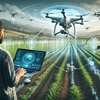Hi everyone, Chris Nunito here. With over 13 years of experience in the efficiency consultation industry, I've had the pleasure of working with a wide range of clients. Throughout my career, I've seen firsthand the transformative power of technology in improving various sectors, and healthcare is no exception. Today, I want to delve into a specific area that's making waves in mobile app development for healthcare: UVC cameras.
What is a UVC Camera?
UVC, or Universal Video Class, refers to a standard that allows computers to recognize and utilize connected cameras without requiring specific drivers. This essentially makes UVC cameras plug-and-play devices, simplifying integration into various applications, including mobile apps.
The Rise of UVC Cameras in Healthcare Mobile Apps
The healthcare industry is rapidly embracing mobile technology to improve patient care, communication, and accessibility. UVC cameras play a crucial role in this shift by enabling a plethora of functionalities within healthcare mobile apps. Let's explore some of the exciting possibilities:
-
Remote Patient Monitoring: UVC cameras can be integrated into mobile apps to facilitate remote patient monitoring. Imagine a scenario where a patient recovering at home can use a mobile app to connect with a doctor or nurse for visual consultations. The UVC camera allows for real-time wound monitoring, showcasing progress or any potential issues. This not only empowers patients but also reduces hospital readmission rates and optimizes healthcare resource allocation.
-
Telemedicine and Virtual Check-Ins: UVC cameras are a game-changer for telemedicine and virtual check-ins. Patients in remote areas or those with mobility limitations can now conveniently connect with healthcare professionals through mobile apps. The UVC camera enables two-way visual communication, fostering a more personal and interactive experience compared to traditional phone consultations.
-
AI-powered Diagnostics and Analysis: The integration of UVC cameras with artificial intelligence (AI) opens doors for innovative diagnostic tools. Mobile apps can be designed to capture images or short videos through the UVC camera, which can then be analyzed by AI algorithms to detect potential health issues. Imagine an app that allows users to scan a mole for signs of skin cancer or capture an image of their throat for preliminary strep throat analysis. While not a replacement for professional diagnosis, such AI-powered tools can empower patients with greater awareness and prompt them to seek proper medical attention.
-
Improved Medication Adherence: Medication adherence is a significant challenge in healthcare. UVC camera-enabled mobile apps can be developed to remind patients to take their medication. The camera can be used to capture proof of medication intake, ensuring patients stay on track with their prescribed regimen. This can significantly improve treatment outcomes and overall health management.
A Case Study: Enhanced Skin Cancer Detection
During my consulting experience, I had the opportunity to work with a team developing a mobile app for skin cancer detection. The app incorporated a UVC camera that allowed users to capture high-resolution images of moles and other suspicious lesions. These images were then uploaded securely to a cloud server where AI algorithms analyzed them for potential cancerous signs. The app displayed a risk score and recommended users consult a dermatologist for further evaluation if the score exceeded a certain threshold. This app empowered individuals to proactively monitor their skin health and potentially detect skin cancer at earlier stages, leading to better treatment outcomes.
The Future of UVC Cameras in Healthcare Mobile Apps
The potential of UVC cameras in healthcare mobile apps is vast and constantly evolving. As technology advances, we can expect even more sophisticated functionalities to emerge. Here are some exciting possibilities for the future:
- Integration with Augmented Reality (AR): Imagine a mobile app that utilizes a UVC camera and AR to overlay vital signs like heart rate or blood oxygen levels on a patient's live video feed during a teleconsultation. This can provide healthcare professionals with valuable real-time data to enhance diagnosis and treatment decisions.
- Mental Health Support: UVC cameras can be integrated into mobile apps designed to support mental health. These apps could employ facial recognition and sentiment analysis to detect signs of anxiety or depression, prompting users to connect with mental health professionals or access relevant resources.
Conclusion
UVC cameras are revolutionizing the way healthcare is delivered and experienced. By integrating UVC cameras into mobile apps, healthcare professionals can expand their reach, improve patient care, and empower individuals to take a more active role in their health management. As technology continues to evolve, the possibilities for UVC cameras in healthcare mobile apps are truly limitless.


No comments yet